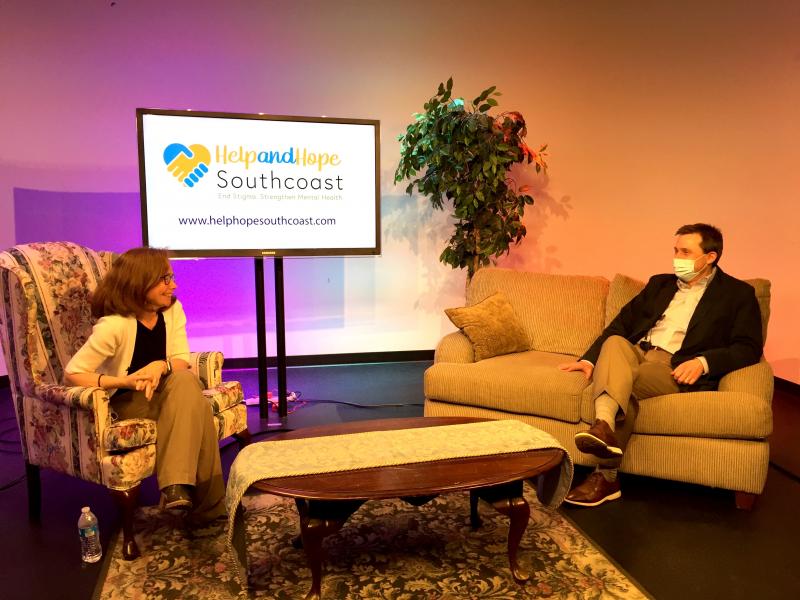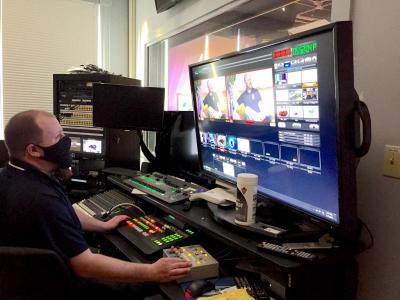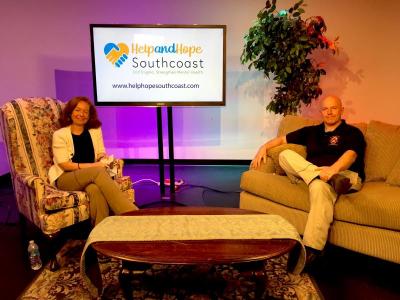Dartmouth Community Media helps raise awareness on mental health
As the current mental health crisis worsens due in part to pandemic-related stress, depression, anxiety, and isolation, Dartmouth Community Media is doing its part to raise awareness.
The community TV station has partnered with the Help and Hope Southcoast campaign — a coalition of area organizations aiming to end stigma and strengthen mental health — to produce Wellness Wednesdays, a weekly video series.
In each 20-minute episode, host and former Standard-Times editor Beth Perdue speaks with local healthcare professionals and service providers about mental health.
The video series helps highlight work being done locally on this topic, and aims to start a conversation on how South Coast residents can help support themselves and each other.
Previous guests from around town include Rev. Scott Ciosek from the Bridge Center for Hope and Healing in Padanaram as well as Dartmouth Youth Advocate Deloris Joseph.
Help and Hope Southcoast was founded last year by Carl Alves, president of the New Bedford-based nonprofit Positive Action Against Chemical Addiction, and Rev. David Lima of the Greater New Bedford Suicide Prevention Coalition.
“In New Bedford there’s already so much collaboration,” noted Perdue.
So when Covid hit, she said, the organizations’ leadership started looking ahead and talking about how stigma around mental health “still prevents people from getting help.”
“There was also this real sense that people were feeling hopeless and helpless,” she added. “Part of it was about showing that help exists, and part of it was also trying to push this message of hope.”
“I would say that mental health was a crisis before the pandemic,” noted Paul Hammerness, Chair of Psychiatry for Southcoast Health and interviewee in an upcoming Wellness Wednesdays episode.
“We were not in good shape before the pandemic. And the pandemic has just exaggerated it — but unequally.”
Hammerness noted that inequality can be based on lack of access to healthcare for certain groups due to limited transportation, limited financial means, or racial disparities.
“There are inequities that have exaggerated the impact for people,” he said.
But he added that one silver lining is that the crisis “certainly has brought to people’s attention that mental health impacts can be experienced by everybody under duress.”
Health care professionals at South Coast and statewide are currently working to connect psychiatric care with primary care as a way to improve access, he said — and because mental health is inextricably linked with physical health.
“They’re so interconnected. A person with diabetes who is depressed is going to do worse than the person who doesn’t have depression,” Hammerness noted. “A person with COPD and anxiety is going to do worse than the person with just COPD. It impacts everything.”
As for mental health during the pandemic, he added, “everyone’s dealing with this right now, in all different ways.”
Perdue said that thus far the series has seen “really good” viewership, adding that the more people talk about mental illness and share their experiences, the better.
“We had a lot of guests [that had experienced mental illness]...and were working in fields to help the same people who were going through what they had gone through,” she noted. “And it’s such a powerful story.”
Part of the show’s message, she added, is just showing that the people doing this type of work in the region are people you might know.
“So if you pick up the phone and you call for help, to kind of show you that they’re just your neighbors,” Perdue said. “They can help you. And it’s not something to have a lot of fear around.”
The purpose is twofold, she noted: to encourage open discussions on mental health and to encourage people to help each other.
“There was a time when cancer wasn’t talked about,” Perdue said. “Can you imagine? Think of all the support that cancer patients get now.”
“Bipolar disorder, depression — Can we get these topics so out in the open that anyone can help anyone a little bit with it?”
“A lot of times, the best help is just someone saying ‘How are you today?’ and listening,” she added. “You don’t always need to be a mental health professional.”
To learn more about Wellness Wednesdays or Help and Hope Southcoast, visit www.helphopesouthcoast.com.















